Filmmaker Bio:
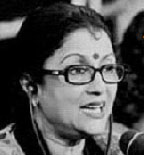 Date
of birth (location): 25 October 1945 Calcutta, West Bengal, British
India. [Now India]
Date
of birth (location): 25 October 1945 Calcutta, West Bengal, British
India. [Now India]Aparna Sen is one of India's most celebrated directors. Her directorial debut was an English film, 36 Chowranghee Lane, which she also wrote. The film won The Grand Prix at the Manila International Film Festival and the National Award for Best Direction in India. Her directorial work also includes memorable films such as Sati, Parama, and Yugant. Daughter of the renowned film historian, critic, and filmmaker, Chidanda Das Gupta, Aparna Sen is also one of India's finest actresses and has won several awards for acting.
Filmmaker Bio:
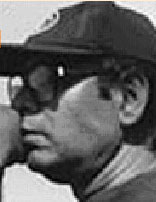 Date
of birth (location): 11 February 1944 Anara, India
Date
of birth (location): 11 February 1944 Anara, India Bengali poet and director, Dasgupta was a lecturer in economics at Calcutta University. Many of his poems have been published in various journals. His poeticism has been extended to cinema as well. During the early stages of his film career, Dasgupta made films inspired by Satyajit Ray's realistic films and later moved on to other forms.
Filmmaker
Bio:
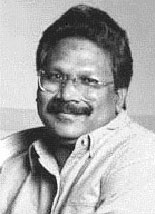 Date
of birth (location): 1956 Madras, Tamil Nadu, India
Date
of birth (location): 1956 Madras, Tamil Nadu, India
Mani
Ratnam is certainly the biggest director in South India today and a much-respected
one all over India as well. He has revolutionized the Tamil Film Industry
with technically strong films that are beautifully photographed with well
picturised songs. Every frame in a Mani Ratnam film is perfectly composed
and beautifully backlit even if this style involves total violation of
tonal, focal and colour continuity.
Born in 1956 in Madras, he studied at Madras University and then received
a management degree at the Bajaj Institute, Mumbai. He worked initially
as a management consultant before getting in to films.
Filmmaker Bio:
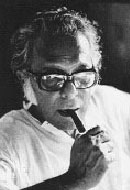 Date
of birth (location): 14 May 1923 Faridpur, East Bengal, British India.
[Now in Bangladesh]
Date
of birth (location): 14 May 1923 Faridpur, East Bengal, British India.
[Now in Bangladesh]Sen is one of his nation's most politically active filmakers. In the mid-1940s he joined the Indian People's Theatre Association and at that time began to read about and study film. Sen used location shooting and non-professional casts in his early films. By the 1970s he was making wider use of symbolism and allegory. Sen's films have won numerous international awards. Kharij (1982) is a scathing look at the hypocritical reaction of a bourgeois Calcutta family to the death of a servant boy, took home the Jury Prize from the 1983 Cannes Film Festival.
Filmmaker Bio:
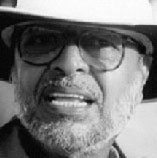 Date
of birth (location): 14 December 1934 Aliwal, Hyderabad, British India
(now Andhra Pradesh, India)
Date
of birth (location): 14 December 1934 Aliwal, Hyderabad, British India
(now Andhra Pradesh, India)Shyam Benegal's contribution to the Hindi new wave cinema is remarkable. Most of his early day films were artistically superior and commercially successful. He introduced some of the most talented artists to Hindi films including Shabana Azmi, Naseeruddin Shah, Om Puri, Smita Patil and Amarish Puri. Benegal's first film Ankur narrated the Indian rural life and the feudal system.His later films Nishant, Manthan, Bhumika and Junoon added strength to the new wave cinema movement in India.
Filmmaker
Bio:
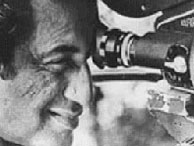 Date
of birth (location): 2 May 1921 Calcutta, West Bengal, British India.
[now India]
Date
of birth (location): 2 May 1921 Calcutta, West Bengal, British India.
[now India]
Date of death (details): 23 April 1992 Calcutta, West Bengal, India.
Satyajit
Ray was born in Calcutta on May 2nd., 1921. His father, Sukumar Ray was
an eminent poet and writer in the history of Bengali literature. In 1940,
after receiving his degree in science and economics from Calcutta University
he attended Tagore's Viswa-Bharati University. His first movie Pather
Panchali (1955) won several International Awards and set Ray as a world-class
director. He died on April 23, 1992.